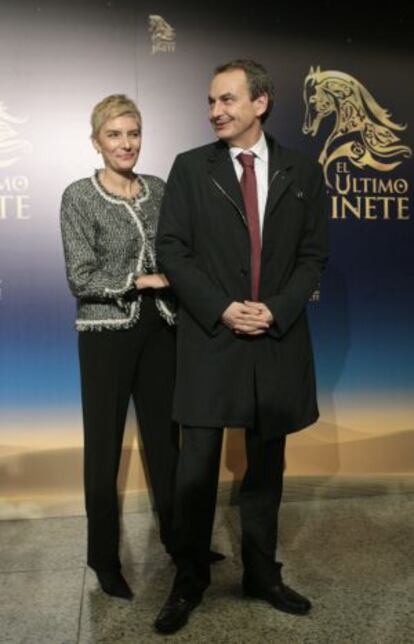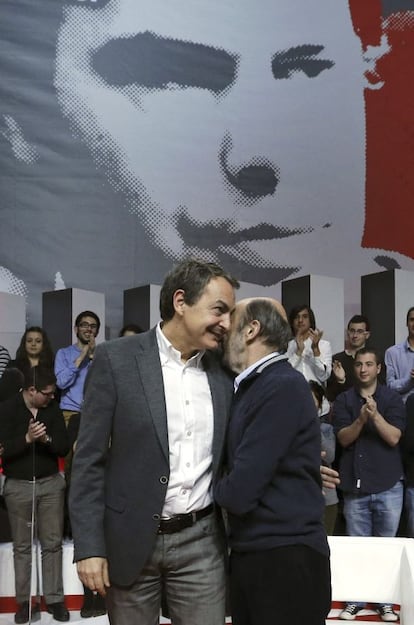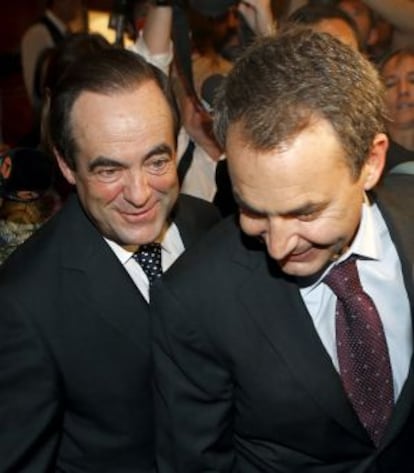Zapatero: “What’s done is done”
One year on since the Socialists' election defeat and Zapatero´s exit from politics The former PM looks back on his achievements and failures


It is almost one year since José Luis Rodríguez Zapatero stepped down as prime minister following an electoral disaster that plunged his Socialist Party into an unprecedented internal crisis. During this time he has kept out of politics, and public life. He agreed to talk to EL PAÍS to discuss the last 12 months, meeting in his small, cramped office at the Council of State in Madrid, which barely has room for a table and two small armchairs. On the wall hang a few paintings lent by the Reina Sofía art gallery, along with photographs of the king with Zapatero and other prime ministers. The window looks out onto the viaduct that crosses the western edge of the city. He says he is proud to be linked to the Council of State, the government's main consultative body, describing it as "serious and rigorous," and which keeps him in contact with "experienced and independent" advisors and lawyers.
He has just finished writing a lengthy piece on same-sex marriage for French daily Le Monde , and shows the article proudly. He left office 12 months ago and says he is not nostalgic, describing the constant state of worry, "at times close to anxiety," that he used to experience as having shifted to a more distanced concern about the country.
His new situation, after almost eight years living in the Moncloa prime-ministerial residence, has allowed him "to once again enjoy being with my family and friends, the people who give one a sense of life, as well as having time to read and write."
Zapatero is an early riser, and is breakfasting by seven in the morning while reviewing the daily newspapers. Four times a week he goes for a run. Then he travels to the Council of State or goes to the Ideas Foundation where he is head of its Global Progress Foundation. He generally eats out at lunchtime, meeting with friends and colleagues to discuss politics, the economy and journalism.
It´s true what they say about the telephone not ringing anymore"
Other than that, he says he has little other social contact. "It's true what they say about the first thing you notice after leaving office is that the telephone stops ringing," he laughs. But he is happy to be left alone to read and write: "I am reading a great deal about the economic crisis in the context of Europe."
He is also putting the finishing touches to his book, after delaying publication, believing that he should wait a little longer. The book is not a memoir, unlike that of his predecessor in office, José María Aznar. Instead, it is focused on the crisis, both during his time as prime minister and since. He hopes it will contribute something to the collective understanding of what has happened to Spain over the last decade.
"I have tried to write honestly about what I lived through and what I felt at the time, about the contradictions, about what I was unable to achieve... and through that direct involvement, now that I am no longer prime minister, I hope to offer my assessment of how the crisis has hit Spain and Europe at the political and economic levels."
Needless to say, having stood down as a member of Congress, he has respected the tradition of not criticizing the policies of his successors in leading the country or at the helm of the Socialist Party. Zapatero has come to terms with being widely regarded, by left and right, as the man responsible for the mess the country is in; the "inheritance" which is frequently maligned by members of today's Popular Party (PP) government.

"If you believe in democracy, you have to learn to live with criticism. I am no longer in politics. This book avoids taking sides, and has a wide political focus. It is also about what I wanted to do, but was unable to," he says, adding that it is in part an answer to the criticism he has received, although he insists that he bears no "grudge" against his political enemies. "Despite all that has happened, I have retained my respect for my adversaries, as well as my calm."
On the subject of the inheritance he handed on to the current administration, he insists that he did the right thing in taking every measure possible to prevent the EU from bailing out the Spanish economy as it did in Portugal, Greece and Ireland, and that things could have been much worse.
He admits that the book is anything but an exercise in self-criticism. "I shine a light into some areas, particularly on the structural weaknesses of the Spanish economy when the crisis hit." He believes that Spain still has a long way to go before there can be any talk of recovery. "In the short term we still face difficult times, very difficult times, and our future in what is a trans-national crisis will depend absolutely on how things develop within the EU."
Zapatero made history by including more women in his cabinet than any other government in Europe, but the lack of political experience of some of them prompted criticism, to which Zapatero responds that his government also included heavyweights such as María Teresa Fernández de la Vega, Pedro Solbes, José Bono, Alfredo Pérez Rubalcaba and Manuel Chaves - he fails to mention Carme Chacón, whom he promoted to defense minister and who would narrowly lose out to Rubalcaba in the subsequent party leadership battle. "In any event, the prime minister is 90-percent responsible for the decisions of the government. I am very grateful to the men and women I worked with. They gave me their loyal support and my feelings toward them haven't changed."
The liberals call the shots but they reject certain principles behind democracy"
He admits that his time in office dampened his belief in "the ability of politics and democracy to change things. Perhaps it is a problem of our time, but democracy has handed itself over to economics. It's the liberals who are calling the shots right now, and in large part they reject many of the principles behind democracy, such as equality."
At the same time, the former prime minister believes that Spain's democracy showed its strength in bringing about the demise of ETA, and its forty-year campaign of violence for an independent Basque Country. Even so, he has been criticized by the PP and by organizations representing the victims of ETA's terrorism. In any event, he highlights the role played by a wide range of politicians, legal experts, academics and negotiators in ending the violence. "It's a very personal thing; we all see it differently. I have so many people to thank for their part."
In any event, he refuses to be drawn either on his failings or his successes: "I don't like to talk about these things. I am modest, and certainly not objective. What's done is done. It is too soon to draw any conclusions."
The one subject he has spoken out on since leaving office is the independence campaign led by Catalan premier Artur Mas. Zapatero says that he has always recognized the unique status of Catalonia, but believes that Mas has broken the rules of the game: "For me it is contradicting history to defend a union with Europe while at the same time seeking to pull away from Spain."
He says he is in regular contact with his successor as secretary general of the Socialist Party, Alfredo Pérez Rubalcaba. "I don't give him advice; I express my opinions. I just want him to know that there are others of us out here who understand how difficult his job is." He says he also talks regularly with former Socialist leader Felipe González, as well as with the secretary general of the UGT labor union, Cándido Méndez.
Zapatero says that he always enjoyed good relations with Mariano Rajoy
That said, he generally keeps his distance from the party. He occasionally shows up at events, he says, and in May was invited by the party to address a group of post-graduate students on political leadership. He told them that party leaders must have at least three qualities: "The aptitude and the attitude to represent the ideas and wishes of the electorate, and which requires the ability to listen and to understand; to take risks, which means making decisions and then defending them, even if sometimes they seem contradictory; and finally to recognize that to win in the long term it is sometimes necessary to accept defeat in the short term."
On December 2, he attended an event to commemorate the 30th anniversary of the first administration led by Felipe González. Addressing the party faithful, he said: "We need a Spain that understands more, a democracy whose legitimacy is strengthened each day, and we need a party that makes demands and that retains people's affection, loyalty, and unity."
Since leaving office he has not met formally with his successor, Mariano Rajoy, although the pair have spoken at the occasional official act, such as his swearing in at the Council of State. He says that on a personal level, the two always got on, and that his relations with other members of the government are "cordial." Similarly, he says he maintains good relations with the Crown, and is always happy to meet with King Juan Carlos, for whom he says he feels a genuine affection.

Zapatero says that while cross-party action is necessary to confront the crisis, the Socialist Party itself needs to find greater unity, and refuses to discuss the power struggle between Rubalcaba and Chacón, saying that he has kept out of the debate from day one.
He says he is happy to attend events such as the book launches of former colleagues José Bono or Jordi Sevilla. Asked why he did not attend the funeral of Santiago Carrillo, despite his long-standing friendship with the veteran Communist Party leader, he says he preferred to wait until after the event, and then visit the family privately.
Recent months have seen Zapatero attend a number of conferences abroad, including the Doha International Forum and the Rio de Janeiro summit on sustainability. He says that his message to the international community is not to underestimate the ability of the European Union and Spain to overcome the current crisis, and that Europe will remain an important player on the global stage.
But, he concludes, what he enjoys most now that he is no longer in office is having time to read and to write, saying that as soon as he has published his book on the crisis, he will begin work on another, although he has yet to decide on the subject.
Tu suscripción se está usando en otro dispositivo
¿Quieres añadir otro usuario a tu suscripción?
Si continúas leyendo en este dispositivo, no se podrá leer en el otro.
FlechaTu suscripción se está usando en otro dispositivo y solo puedes acceder a EL PAÍS desde un dispositivo a la vez.
Si quieres compartir tu cuenta, cambia tu suscripción a la modalidad Premium, así podrás añadir otro usuario. Cada uno accederá con su propia cuenta de email, lo que os permitirá personalizar vuestra experiencia en EL PAÍS.
En el caso de no saber quién está usando tu cuenta, te recomendamos cambiar tu contraseña aquí.
Si decides continuar compartiendo tu cuenta, este mensaje se mostrará en tu dispositivo y en el de la otra persona que está usando tu cuenta de forma indefinida, afectando a tu experiencia de lectura. Puedes consultar aquí los términos y condiciones de la suscripción digital.







































